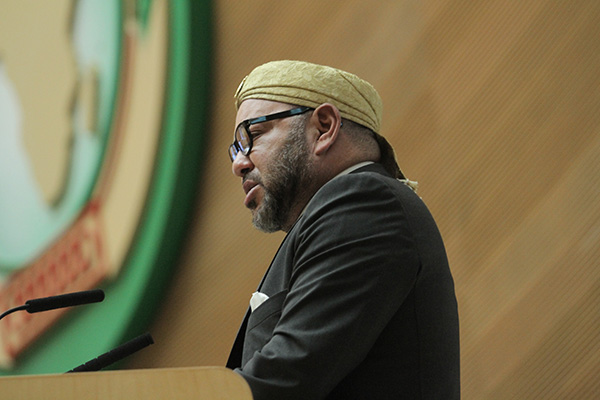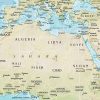
On 30 January 2017, the number of member states of the African Union (AU) rose from 54 to 55. On that day, nearly 40 of its members supported the request for readmission to the pan-African organisation filed by Morocco, the only state on the African continent that had hitherto remained on the sidelines.
Morocco was a founding member in 1963 of the Organisation of African Unity (OAU), the predecessor of the AU, but decided to abandon it in 1984 in protest for the admission of the Sahrawi Arab Democratic Republic (SADR). For its part, the SADR appears as a founding member of the AU in its Constitutive Act that came into force in May 2001.
After more than three decades of absence, Morocco has returned to the pan-African organisation despite the fact that the SADR remains a full member. The Moroccan decision would have seemed unimaginable until less than a year ago. However, in July 2016 King Mohammed VI recognised that his country’s ‘self-exile’ from the AU had to be corrected, in what was viewed as a recognition of the futility of the ‘empty-chair’ policy.
The decision to request readmission in the continental organisation has been a personal commitment of the Alawi monarch. The decision was preceded by an intense diplomatic campaign that included numerous visits by the King of Morocco to countries in sub-Saharan Africa. In addition, Morocco has developed a plan to expand its economic and commercial activities in the rest of the continent, especially in West-African and Francophone countries. Morocco is currently the second-largest African investor in the continent, behind South Africa. The presence of its banks, telecommunications companies, insurers and airlines continues to grow in different African countries. Rabat also seeks greater religious influence through the formation of sub-Saharan imams and ulema in Moroccan Islamic institutions.
However, Morocco’s re-entry in the AU raises a number of questions, with the Western Sahara conflict as a backdrop. The first and most obvious is the contradiction of assuming the Constitutive Act of the organisation while denying the existence of one of its members. Morocco recognises neither the SADR nor the option of independence in a hypothetical referendum on self-determination in Western Sahara, and it is practically unthinkable that this will change under current conditions.
Article 4 of the Constitutive Act establishes the following ‘principles’ for relations between AU member states: sovereign equality and interdependence, respect of borders existing on achievement of independence, peaceful resolution of conflicts, prohibition of the use of force or threat to use force, peaceful co-existence, as well as the right to request intervention from the Union in order to restore peace and security, among other principles.
The fact is that Morocco has re-entered the AU without preconditions, but also without obtaining concessions (at least publicly). A first consequence is that the authorities of Morocco and the Polisario Front will have to get used to sitting around the same table at the summits and meetings of the different AU bodies. It may be that, from the Moroccan official perspective, it is expected that co-existence will be more or less brief in time. However, there is no guarantee that this will be the case. The conflict over Western Sahara is full of examples of situations that seem temporary in principle, but in fact have an indefinite lifespan.
With the entry of Morocco in the AU, the territorial conflict over the former Spanish Sahara has been taken to the heart of the pan-African organisation. With this, Rabat can try to neutralise from within the only international organisation in which the SADR receives member-state treatment. It could also be that the Moroccan authorities are seeking to push both their allies and their adversaries in the AU up against the ropes, hoping to achieve, over time, a triple objective: (1) the expulsion of the SADR from the AU; (2) the transfer of the diplomatic battle over the Western Sahara conflict from the UN to the AU; and (3) ultimately to impose their solution of limited autonomy for the territory within the Alawite kingdom.
The most optimistic voices have stressed that Morocco’s return to the pan-African organisation is an opportunity to make progress in continental integration through the resolution of conflicts from within the AU. They also interpret that the step taken by Morocco reveals a more conciliatory approach, not having imposed preconditions. In contrast to the above, the most pessimistic observers consider that there is a risk that Morocco will opt to torpedo the operation of the pan-African organisation from within. In addition, they warn that Rabat can transfer aggressive tactics of political pressure to the interior of the AU, as it has done in the past with other partners and international organisations when certain Moroccan expectations were unmet.
Morocco has explicitly stated its willingness to force the suspension or expulsion of the SADR from the Union. However, the latter’s bylaws do not provide for the expulsion of a member, only the suspension of governments which come to power through unconstitutional means. In order for Morocco to achieve its objective, it would need to bring about a modification of the bylaws, requiring a vote in favour of two-thirds of the members. If such a step were to be taken, it would encounter the determined rejection of important African countries such as South Africa, Nigeria and Algeria, among others. It could happen that the Maghrebi battle for the Western Sahara becomes a continental battle over spheres of influence. Nor can it be ruled out that the new status quo will be prolonged over time, with Morocco unable to advance its interests.
Time will tell whether Morocco’s re-incorporation to the AU will help to bring the positions of the various Maghrebi players closer or if, on the contrary, it will raise the level of tension between them, thus contaminating intra-African relations. It is clear that Morocco has made a strong bet by entering the AU, but it is also evident that its bet is accompanied by real risks for its own interests and image. Would Morocco host an AU summit with all of its 55 members?


